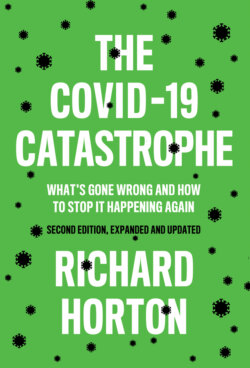The COVID-19 Catastrophe

Реклама. ООО «ЛитРес», ИНН: 7719571260.
Оглавление
Richard Horton. The COVID-19 Catastrophe
CONTENTS
Guide
Pages
Dedication
The COVID-19 Catastrophe. What’s Gone Wrong and How to Stop it Happening Again
Preface to the Second Edition
Preface
Acknowledgements
Introduction
Notes
1 From Wuhan to the World
Notes
2 Why Were We Not Prepared?
Notes
3 Science: The Paradox of Success and Failure
Notes
4 First Lines of Defence
Notes
5 The Politics of COVID-19
Notes
6 The Risk Society Revisited
Notes
7 Towards the Next Pandemic
Notes
Epilogue
Notes
POLITY END USER LICENSE AGREEMENT
Отрывок из книги
For those whose lives were lost to COVID-19
Richard Horton
.....
We should not be surprised that the behaviour of the public was similar across the centuries. During the first wave of lockdown in 2020, people willingly, even enthusiastically, followed the instruction to stay home. They learned to enjoy the opportunity to take up new activities. The same was true in 1665. Defoe mentions baking bread and brewing beer. Public compliance during the first wave of the 2020 pandemic successfully suppressed the outbreak. But, once it was controlled, people desperately wished to return to some level of normal life. Governments wanted to reignite their economies. Perhaps everyone was exhausted and fatigued by the ‘anthropause’ – this temporary cessation of humanity. The result? Many countries let their guard down and the virus bounced back – a second wave. In 1665, a similar complacency took hold. By the end of September the plague’s fury was beginning to relent. People came out of their homes, shops opened, businesses resumed. The outcome of this ‘imprudent rash conduct’ was a second wave of plague that ‘cost a great many’ lives.
The economic calamity that has ensued from COVID-19 was entirely predictable. Defoe explains how manufacturing and trade were brought to ‘a full stop’. He describes the ‘immediate distress’ that followed, rising levels of unemployment, deepening inequality, hunger and the overall ‘misery of the city’. Relief provided to the poor was then through charitable assistance rather than from government furloughs and job support schemes. But the effects were similar. Here is Defoe: ‘This caused the multitude of single people in London to be unprovided for; as also of families, whose living depended upon the labour of the heads of those families; I say, this reduced them to extreme misery.’
.....